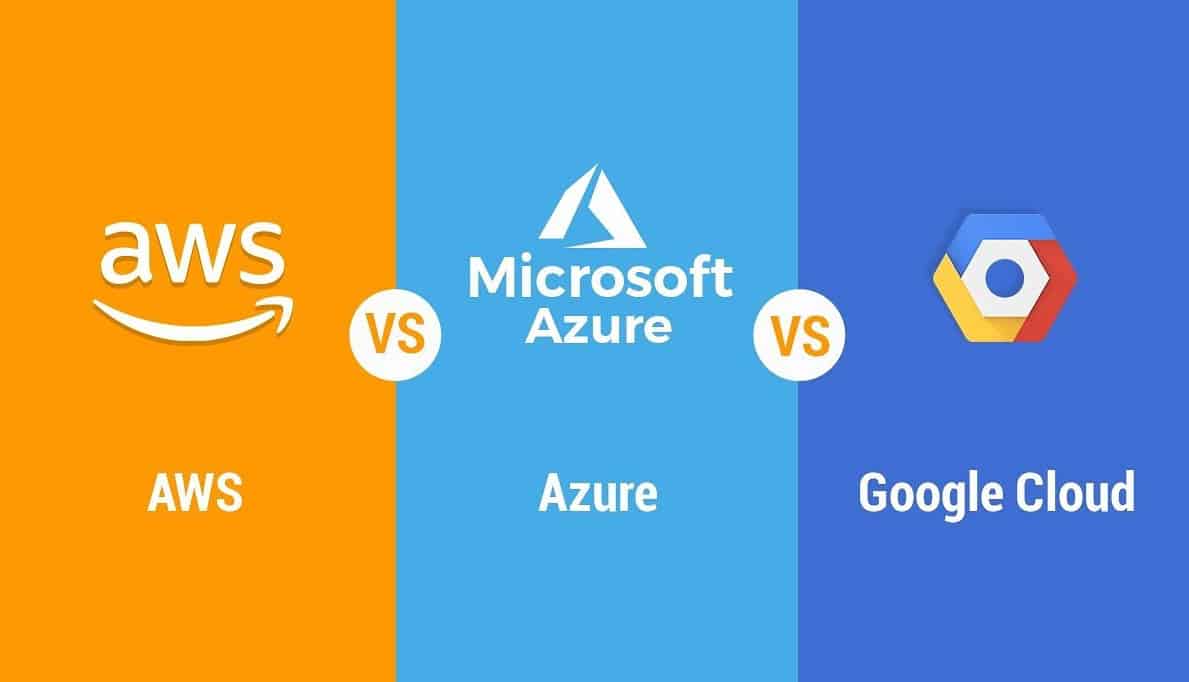As cloud computing continues to dominate the tech landscape, three major platforms have emerged as the top contenders: Microsoft Azure, Amazon Web Services (AWS), and Google Cloud.
Each of these platforms offers a broad range of services, solutions, and capabilities tailored to various business needs, making them highly competitive in the market. However, there are key differences between them in terms of service offerings, pricing, performance, scalability, and other factors that set them apart.
Let’s dive into a comprehensive comparison of Azure, AWS, and Google Cloud, covering the core aspects to help businesses decide which platform best suits their needs.
1. Market Share and Adoption
- AWS: Amazon Web Services, the pioneer of cloud computing, commands the largest market share, holding around 32% of the global cloud market. AWS has been in the market since 2006 and has built an extensive customer base, including enterprises, startups, and government organizations.
- Azure: Microsoft Azure follows closely with about 23% of the market share. Azure benefits from Microsoft’s strong presence in enterprise solutions, including Office 365, Windows Server, and SQL Server, making it a preferred choice for businesses already invested in Microsoft products.
- Google Cloud: Google Cloud Platform (GCP) holds around 10% of the market share. It’s known for its strong focus on data analytics, machine learning, and AI. Google Cloud is particularly popular among tech companies and organizations heavily reliant on big data.
2. Service Offerings
- AWS: AWS offers the most extensive range of cloud services, with over 200 services, covering everything from compute, storage, and networking to AI, machine learning, IoT, and analytics. Notable services include EC2 (compute), S3 (storage), and Lambda (serverless computing). AWS also excels in high-performance computing (HPC) and provides a vast selection of tools for developers.
- Azure: Azure provides over 200 services, with a strong focus on enterprise services, including hybrid cloud solutions, DevOps, IoT, and AI. Azure’s key services include Azure Virtual Machines (compute), Blob Storage (storage), and Azure Functions (serverless). Azure is often favored by companies using Microsoft tools like Active Directory and Windows Server, thanks to seamless integration.
- Google Cloud: Google Cloud offers fewer services than AWS and Azure, but it’s a leader in AI, machine learning, and big data. Google Cloud’s standout services include Google Kubernetes Engine (GKE), BigQuery (data analytics), and TensorFlow (machine learning). Google Cloud’s strength lies in its data handling, high-performance analytics, and superior integration with open-source technologies.
3. Pricing
- AWS: AWS pricing can be complex due to the large number of services and options available. However, it offers pay-as-you-go pricing, reserved instances, and savings plans to help customers optimize costs. While AWS provides a free tier, long-term use can be expensive without careful management of resources.
- Azure: Azure pricing is similar to AWS, with pay-as-you-go, reserved instances, and a free tier. Azure has flexible pricing models, including hybrid benefit programs that allow businesses to save money by using existing Microsoft licenses. Azure also tends to be cost-effective for Windows-based applications and services.
- Google Cloud: Google Cloud is often considered the most cost-competitive of the three, particularly for compute and storage services. Google Cloud offers sustained-use discounts and committed-use contracts, which can provide cost savings for long-term projects. Google also emphasizes transparent pricing and provides an easy-to-understand cost calculator.
4. Performance and Scalability
- AWS: AWS is known for its global reach and extensive network of data centers, with 102 availability zones across 32 geographic regions. AWS provides exceptional performance, scalability, and reliability, making it the top choice for enterprises needing large-scale infrastructure with minimal downtime.
- Azure: Azure also offers robust scalability and performance, with 67 availability zones in 60 regions worldwide. Its hybrid cloud offerings make Azure a strong choice for organizations looking to bridge on-premises data centers with cloud infrastructure. Azure’s close integration with Microsoft enterprise products enhances performance for businesses using those systems.
- Google Cloud: Google Cloud’s infrastructure is slightly smaller than AWS and Azure, with 38 availability zones across 15 regions. However, Google Cloud excels in performance for AI, machine learning, and big data workloads. Its global fiber network ensures low-latency connections, making it an ideal platform for high-performance applications.
5. Hybrid and Multi-Cloud Solutions
- AWS: AWS has improved its hybrid cloud offerings with services like AWS Outposts and the ability to run workloads across on-premises and cloud environments. However, AWS tends to focus more on pure cloud solutions rather than hybrid.
- Azure: Azure stands out for its hybrid cloud capabilities, with services like Azure Arc, Azure Stack, and Azure Site Recovery. Microsoft has positioned Azure as the leader in hybrid environments, making it a go-to choice for businesses that need to maintain a mix of on-premises and cloud resources.
- Google Cloud: Google Cloud offers Anthos, its hybrid and multi-cloud solution, which allows businesses to manage workloads across on-premises data centers and public clouds, including AWS and Azure. Anthos is a highly versatile platform for multi-cloud environments, making Google Cloud a strong contender in this space.
6. AI and Machine Learning
- AWS: AWS has a strong lineup of AI and machine learning services, including SageMaker (machine learning development), Rekognition (image recognition), and Lex (chatbot development). AWS’s services are robust and highly customizable, catering to various industries and use cases.
- Azure: Azure AI services include Azure Machine Learning, Cognitive Services, and Bot Service, among others. Microsoft’s AI offerings are tightly integrated with its enterprise solutions and are accessible to businesses of all sizes.
- Google Cloud: Google Cloud is the industry leader in AI and machine learning, thanks to its expertise in big data and deep learning frameworks like TensorFlow. Google Cloud’s AI services, such as AutoML, Vision AI, and Cloud AI Platform, are designed for developers and data scientists looking to push the boundaries of AI innovation.
Conclusion
When choosing between Azure, AWS, and Google Cloud, there is no one-size-fits-all answer. Each platform excels in different areas, and the right choice depends on your business needs:
- AWS is the most mature and expansive, ideal for enterprises requiring robust infrastructure, a wide range of services, and scalability.
- Azure shines in hybrid cloud scenarios, enterprise integration, and offers strong support for Microsoft ecosystems.
- Google Cloud excels in AI, machine learning, and big data, making it a top choice for tech-centric companies and data-driven projects.
Ultimately, the decision comes down to your organization’s specific requirements, budget, and technological goals. Please reach more here.
Thank you for reading. We hope this gives you a brief understanding of the latest news. Are you interested in reading other latest articles on Machine Learning and Data Science? Explore our Technology blogs for more.



